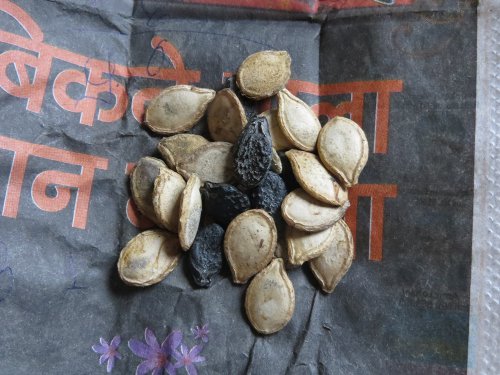WWOOFing in India
Starting June 1, 2013, we were fortunate to spend eight fantastic days WWOOFing at Binsar Valley River Camp, an organic farm for self-consumption located 500 meters away from Mangalatha Village, Almora District, in the state of Uttrakhand, India. This piece of heaven on earth is the life project of Raju, a man with a conscience love for nature and a clear vision of how healthy living feels like. He has been working on his land for the past 3 years, following his insight to growing organic food, protecting the environment, welcoming, and teaching others to do the same. His farm is his home and also an open place for both WWOOFers and guests looking for the opportunity to be in touch with nature, stay away from the heat, chaos, and pollution of so many cities in India. Since our arrival, we felt embraced and captivated by the landscape, tranquility, and crystalline waters of the Binsar River.
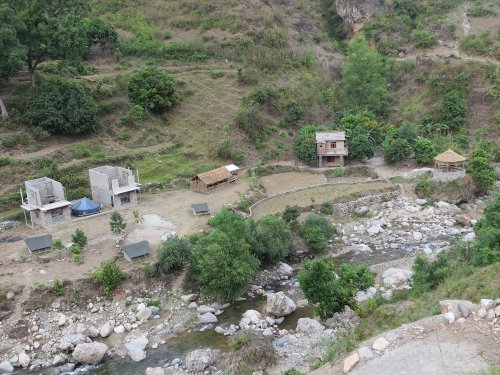
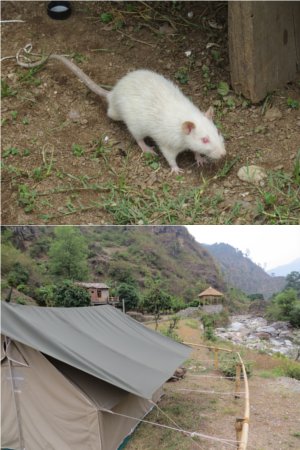
During our time WWOOFing, we experienced countless moments of reflection, relaxation, learning, and enjoyment while interacting with Raju, Aby (Raju’s 12 years old son), Prakash (Raju’s helper), Gori (the pet rat), Tim, and Petra (WWOOFers from the USA and Germany). Our days started around 7 am, after sleeping in a comfortable tent with the sounds of the river and the thunderstorms of the rainy season in the background. We were welcomed into a new day with a delicious lemon grass or masala tea made by Prakash and the enthusiasm of Raju’s farm projects. We took advantage of the pleasant temperatures in the morning and late afternoon to split our daily work hours. Our projects included adding hay to the pavilion’s roof, weeding, preparing soil, and planting. In India, the months of June and July are characterized by warm, humid weather and rain showers from the monsoon season, which are splendid conditions for planting. We planted okra, bell peppers, radish, gourd, and chilies while enjoying the happiness of Raju looking at the promising new crops. He would say: “India without chilies isn’t India, without chilies India stops.”
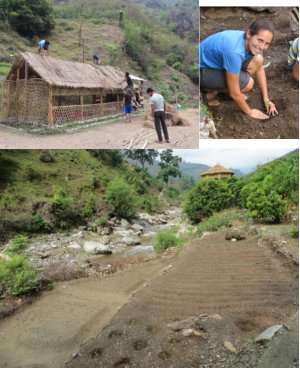
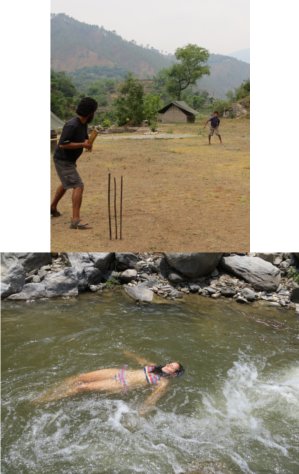
In between our work hours, we were free to experience the farm and its surroundings. The refreshing clean waters of the Binsar River were a perfect place to bathe and observe playful fishes. The green mangos resting under the trees gave us daily excuses to snack on and explore creative chutney recipes. The kitchen was an inviting setting to make chapati and learn traditional vegetarian Indian recipes that were always enriched by the taste of garlic, masala, chili, salt, coriander and turmeric. The bamboo gazebo was a perfect altar for yoga, meditation, conversations, and napping. In the afternoons, we were revived by the invincible spirit and games of Aby, a smart, healthy, organic boy, chess master, and cricket player. At night, the immensity of the sky full of stars dancing to the songs of hidden frogs and insects were soothing pillows to our dreams.
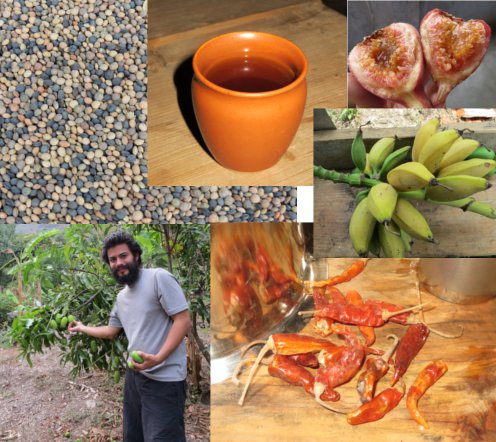
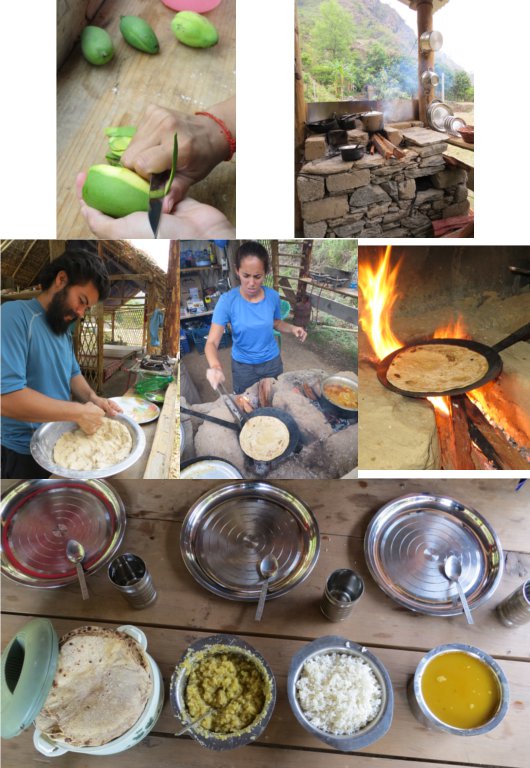
Our WWOOFing experience was very flexible, we worked an average of 4 hours a day, and sometimes even less as Raju wanted us to explore other scenery and activities in the area. He took us on a day hike to his hometown, Mangalatha, where we were able to meet his mother and learn about the lifestyle of the village’s 150 habitats. Raju talked to us about his efforts to educate other farmers in the village about the importance of organic farming and not littering. He explained how farmers in India are pressured by the government to use genetically modified seeds and pesticides, which is a lucrative business for the American company Monsanto. Currently, only 40% of the plantations in Mangalatha are organic. Raju shared with us his observations about the negative effects of chemicals over people’s health, his knowledge on Ayurveda (natural medicine), and his awareness of the importance of organic farming. He also explained to us his thoughts about the problems of our modern society, which prioritized on the largest size and shorter harvesting periods of vegetables and fruits instead of waiting to be naturally rewarded by the cycle of life. Everything in our time seems to be about increasing quantity in a shorter period of time, losing the sense and meaning of quality of life. The obsession of massive production and chemical farming of our industrialized era is one of the major causes of illnesses today as we will always be a reflection of what we eat.


While we were in Mangalatha, we noticed that only women were working in the fields and Raju explained to us the family dynamics in his community. He told us, with sadness, that the majority of the work force in households are women and they are also victims of physical and emotional abuse by their partners, because many men in the village spend their days drinking alcohol amongst each other. Raju talked with sorrow and respect of women in his town, expressing his disappointment with the men’s behavior because he wishes they could be better husbands and fathers to their families. Contrary to the general views of his town and era, Raju’s thinking and choices are revolutionary and inspirational, his farm is a light of hope for what we feel could be a better future for India.
On another day, Raju took us on a hike around the mountains close to the farm. During the walk, we saw multiple pine trees which have been burned and used for extracting their colorful fluids. Raju explained that companies have been “taking the blood of these trees until they dry to death for the purpose of using it for paint manufacturing”. Raju educated us about the serious problem of deforestation in the region, which increases the effects of weather changes, pollution, and global warming. As we continue hiking up, we were surrounded by a peaceful forest where Raju declared his sincere love for mountains while embracing a tree. Finding another human being that shares the same passion and respect for nature is a hopeful confirmation of the existence of kindness in our species. At the end of our walk, and just 1 kilometer away from the farm, we all gathered around the magical sounds and sights of a beautiful waterfall as we splashed around and cleared our thoughts.
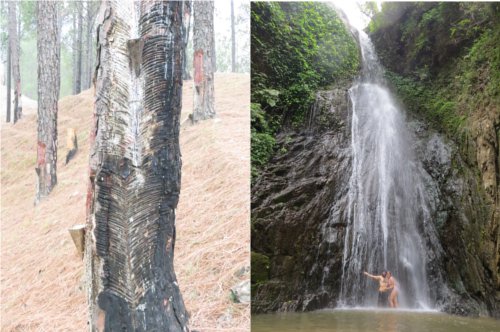
Our WWOOFing experience in Uttrakhand was memorable and by far our favorite activity in India. It was just the beginning of what we envisioned as a long lasting friendship. When we departed, Raju gave us seeds to plant at our next destination. He wishes for a world without borders, where we can all share and enjoy the gifts of nature. We left Binsar Valley River Camp with the nostalgia of walking away from true happiness and the firm intentions of returning one day to this land of prosperity.
